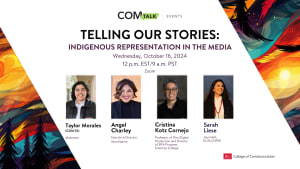COMtalk: Telling Our Stories: Indigenous Representation in the Media
Wednesday, Oct 16, 2024 12:00p -
1:00p
Where:
Online event
Admission:
FREE
Categories:
Lectures & Conferences, University, Virtual
Event website:
https://bit.ly/COMtalk_IndigenousRepresentation
Since 2021, several highly praised shows such as Reservation Dogs, Killers of the Flower Moon, and Rutherford Falls have played important roles in highlighting and celebrating Indigenous storytelling, while dispelling stereotypes of Native Americans. Despite these efforts, representation of Native Americans in the entertainment industry remains low, with less than 1% of Native Americans working in this field. There is still much work to be done to increase the visibility of Indigenous peoples in the media, raise awareness of the injustices affecting their communities, and pay homage to their traditions and culture. This COMtalk will explore how native and non-native individuals can effectively and respectfully engage with and support Indigenous stories.
PANELISTS:
Angel Charley, Executive Director, IllumiNative
Angel Charley is a distinguished Indigenous leader and advocate dedicated to ending violence against Native women and girls. As the former Executive Director of the Coalition to Stop Violence Against Native Women, she has been instrumental in promoting visibility and systemic transformation around gender-based violence.
As a citizen of the Pueblo of Laguna and Navajo Nation, she focuses on empowering Indigenous communities and addressing their challenges. In 2019, she was appointed to the New Mexico Murdered and Missing Indigenous Relatives Taskforce and has been involved in advocacy efforts recognized by the New Mexico State Senate. Charley also participated in the White House Gender Policy Indigenous Women Trilateral Workgroup. She provided expert testimony before Congress, advocating for increased visibility and systemic change to address gender-based violence against Native women and girls. Charley holds a degree in Liberal Arts from the University of Hawai’i. She is a respected member of several boards and organizations working to end gender-based violence and advance social justice.
Cristina Kotz Cornejo, Professor of Film/Digital Production and Director of BFA Program, Emerson College
Raised in the United States and Argentina in a bilingual, bicultural family, Cristina is also a descendant of the Indigenous Huarpe people of the Cuyo region of what is now Argentina. Cristina received a M.F.A. from New York University’s Tisch School of the Arts, a M.A. in Organizational Arts Management from Antioch University and a B.A. in International Relations from the University of Southern California. Cristina's debut feature film, 3 Américas screened at domestic and international festivals and was distributed by Vanguard Cinema and represented by Cinetic Media’s Film Buff. Her short films have screened at festivals around the world. Her documentary short film, Jewel and The Catch was selected by Outfest to be part of the Outfest UCLA Legacy Project of UCLA's Film and Television Archive. Her 360º documentary, “the root is more important than the flower,” played at the Māoriland Film Festival, the Wairoa Māori Film Festival, ImagineNATIVE, International Festival of Indigenous Art and Cinema at Wallmapu, among others. Cristina is also a contributing author in Filming Difference: Actors, Directors, Producers and Writers on Gender, Race and Sexuality in Film, University of Texas Press (edited by Daniel Bernardi).
Cristina teaches media production at Emerson College.
Sarah Liese, Journalist, KOSU (NPR)
Sarah Liese is Diné and an enrolled member of the Turtle Mountain Band of Chippewa Indians. Her grandmother, Mary Morez, gave her the name Twilla, which means "Sparkle Upon the Water."
Sarah's passion is heart-centered storytelling. She currently works as an Indigenous Affairs reporter at KOSU, joining the team in April 2024.
Before that, she created mini-documentaries with a federal public defense office in Mississippi, telling the stories of defendants and their families. She also worked as a researcher with Dr. Victoria LaPoe at Ohio University, where she received her Master of Science degree. She co-authored the 2021 Spotlight Report for the Indigenous Journalist Association, shining a light on stereotypical news coverage in the mainstream media. While in school at OU, she was awarded the Outstanding Master's Student Award in 2022 from the E.W. Scripps School of Journalism.
Sarah presented her findings at the International Indigenous Climate Change Research Summit and International Indigenous Research Conference and received multiple fellowships from the Sundance Institute and the Indigenous Journalist Association.
Moderated by Taylor Morales, screenwriter and storyteller
-

SponsoredDay Trip from Boston: Kayak Castle Neck River at Crane Estate
Saturday, Jul 05, 2025 11:30a
Crane Beach
-

SponsoredAffordable Spanish Classes in Boston (in-person and online courses) | BASE
Monday, Jul 07, 2025 goes until 07/18
Boston Area Spanish Exchange (BASE)
-

SponsoredExplore The New England Botanic Garden at Tower Hill: Day Trip from Boston
Sunday, Jul 06, 2025 11:00a
New England Botanic Gardens at Tower Hill

